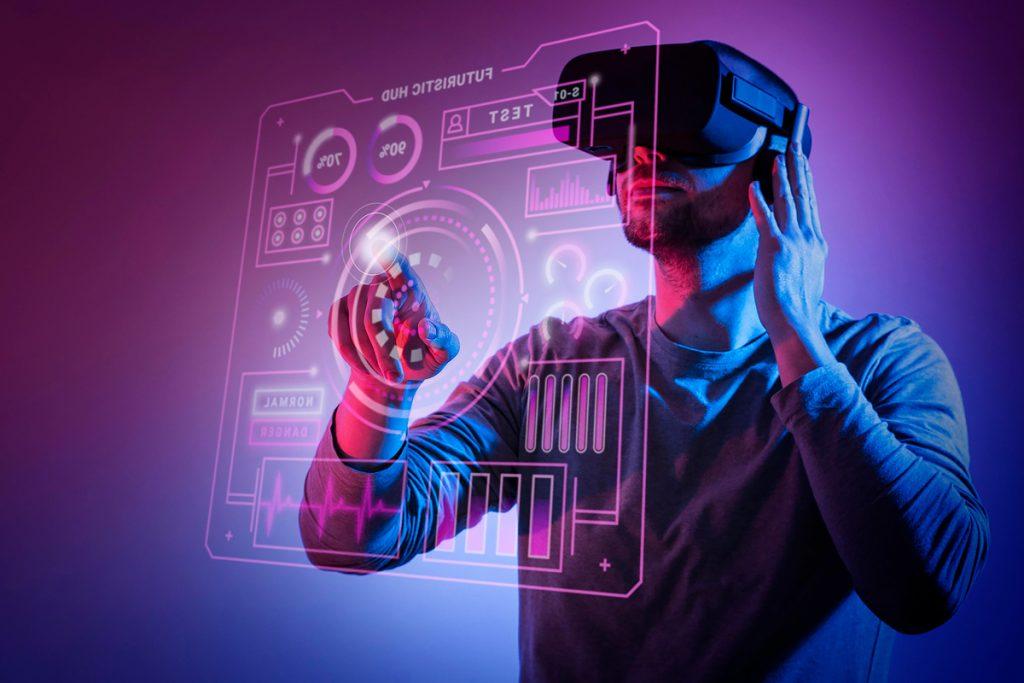What is the Metaverse?
The Metaverse refers to a shared virtual environment that integrates augmented reality (AR), virtual reality (VR), and the internet. Rather than being a standalone virtual realm, it includes interconnected digital locales that users can navigate effortlessly. Inspired by a variety of science fiction works, the term has become more popular as companies such as Meta (previously Facebook) invest significantly in its advancement. This digital cosmos enables users to create, explore, and engage in real-time, offering a multi-faceted experience. It also includes social networks, online gaming, and virtual economies. Though still in its early stages, the Metaverse holds the potential to change how individuals communicate, collaborate, and enjoy entertainment in the digital era.
The Technological Backbone of the Metaverse
Central to the Metaverse are several essential technologies that drive its development. Virtual reality (VR) provides immersive experiences by putting digital users in simulated environments through headsets, whereas augmented reality (AR) superimposes digital imagery on the real world using devices such as smartphones and smart glasses. Blockchain technology is vital as it guarantees ownership and authenticity of digital assets through non-fungible tokens (NFTs). Furthermore, progress in artificial intelligence (AI) improves user interactions by creating lifelike avatars and tailored experiences. These technologies collaborate to produce richer, more captivating virtual environments, establishing the foundation for future advancements in the Metaverse.
Economic Opportunities within the Metaverse
The economic potential of the Metaverse is extensive and encouraging. As businesses begin to delve into this digital space, new market avenues have emerged, including virtual real estate, branded virtual spaces, and the sale of digital products. Companies can organize events, perform transactions, and even create virtual storefronts to interact with consumers in innovative ways. For creators and developers, income can be generated through the creation of in-game assets, augmented experiences, and virtual services. The increasing prevalence of cryptocurrencies further facilitates these transactions, enabling smooth monetization. As the Metaverse evolves, its ability to promote innovation and revenue generation is anticipated to transform conventional business frameworks.
Social Interaction in the Metaverse
Social connection in the Metaverse goes beyond geographical limitations, encouraging worldwide interactions among users. Within these immersive environments, individuals can connect, work together, and socialize through avatars, engaging in activities such as concerts, meetings, or casual virtual gatherings. This setting fosters a sense of community, allowing users to pursue common interests, attend online events, and collaborate on content creation. While it strengthens connections, it also raises concerns about inclusivity and user identity. Developers need to ensure that all participants feel secure and appreciated in their digital interactions. As communication dynamics change within the Metaverse, comprehending human behavior in these environments is crucial for its development.
Challenges of the Metaverse
Despite its possibilities, the Metaverse encounters various challenges that may impede its broad acceptance. Privacy and security issues are paramount, as the extensive data created by users presents risks for abuse and cyber threats. The issue of digital identity how users portray themselves and what privacy protections exist—also demands consideration. Furthermore, interoperability concerns emerge; various platforms need to interact with one another to establish a unified experience. The digital divide is another factor, as numerous users do not have access to the required hardware or high-speed internet. Tackling these challenges is essential for cultivating a secure and inclusive environment for all users in the Metaverse.
Looking Ahead: The Future of the Metaverse
As we anticipate the future, the Metaverse is set to transform how we view virtual spaces and interactions. Innovations in technology are likely to improve the complexity of experiences, rendering them more immersive and attainable. Sectors such as education, gaming, and entertainment are anticipated to be early adopters, trying out virtual classrooms, interactive gaming, and live performances. Additionally, regulatory structures will need to adapt as countries deal with the ramifications of a collective virtual space. In the end, the Metaverse can establish new frameworks for social interaction, economic exchanges, and cultural sharing, making it one of the most thrilling advancements of our digital age.

